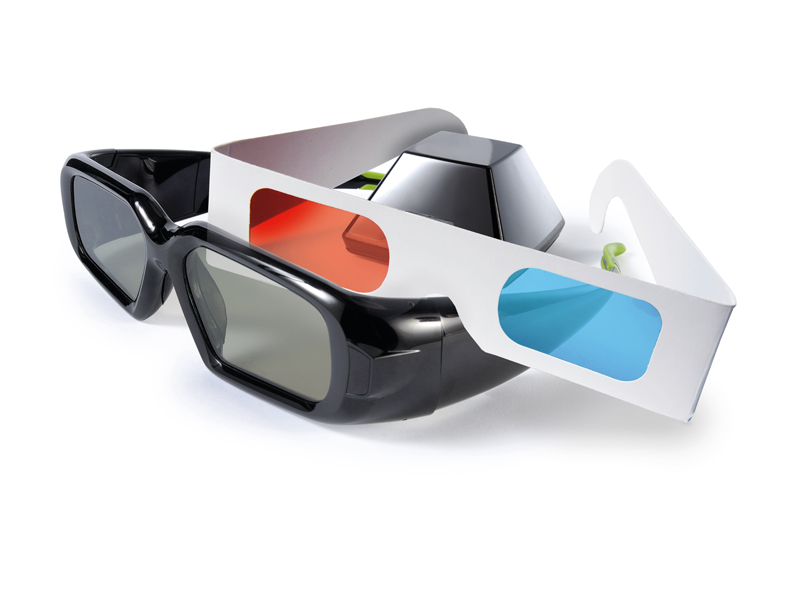Why the 3D revolution is a myth

Call me a cynic but I just don't buy into the so-called 3D revolution.
Sure, I went and paid a quid extra to see Avatar in 3D just like most people.
The problem with that movie though is that it's so fundamentally terrible that the 3D eye candy is the only reason to bother watching it at all - so it's not a good example.
Watching Avatar is a bit like watching footage of a horrific natural disaster or an act of terrorism on the news – you're utterly horrified by what you're seeing and hearing, but you can't help staring at it anyway. Since it came out we've heard lots about how the 3D revolution has finally arrived, but really, the idea that there is some kind of revolution going on is a myth, a fabrication. Anyone remember the '3D revolution' of the 1980s?
News came on Wednesday that the BBC is to conduct a 3D experiment by hijacking its own BBC HD channel on the first weekend of July to broadcast the Wimbledon singles finals in sparkly 3D.
Marc Chacksfield wrote an interesting piece about how this could be a game changer for the format.
I disagree and I'll tell you why.
Sign up for breaking news, reviews, opinion, top tech deals, and more.
People buy new TVs. This is a fact. It has been a fact since the television was invented and it will remain a fact until the sun swells into a red giant, burns the Earth to a cinder and we're all just particles of atomic dust floating about somewhere.
The fact there are so many 3D-ready TVs on the market now means many of these TV-purchasers are going to buy them.
But for a revolution to be a revolution, people would need to be so captivated by 3D that they'd be ditching their current HD TVs and specifically going out and buying a 3D one instead - just for the sheer hell of it.
And then they'd need to fork out more money to get access to 3D content. A tech revolution is a measurable shift in public consciousness surrounding a product or category- the tablet is a perfect example; 25 million iPads sold? That's a revolution.
This isn't what we're seeing with 3D TVs. Indeed, some of the industry insiders I've spoken to at some of the big name companies say that while 3D TV sales are encouraging, they're not selling any better than the previous generation of high-end TVs.
3D sets have merely replaced their older counterparts on the shelves. Manufacturers are starting to include 3D as a regular feature on many screens in much the same way they do now with HD tuners. You could argue it's being included more as an add-on than an innovation, one that you can opt in for, or ignore - hence the number of TVs that have 3D but no bundled glasses.
You've also got other types of 3D products, of course, Nintendo 3DS and LG Optimus 3D included. But again, they're first generation products that will slowly be improved in iterations.
Panasonic said recently that early 3D TV sales are outstripping the mainstream rollout of HD TVs nearly a decade ago. This may be true, but you know what? An HD TV even back in 2005 would cost well in excess of £1000. The good ones cost a heck of a lot more than that.
In contrast, 3D TVs today can be acquired for under £400. Not really surprising then that the uptake has been quicker – if your TV breaks and you decide to buy a brand spanking new one, you'd probably opt for a 3D one too.
The fact is that the rise of 3D products and the development of 3D broadcasting is occurring in tiny, incremental steps just like every other innovation in display technology history and in the wider world.
The BBC was always going to broadcast in 3D eventually, just like every other TV channel on the planet will at some point in the future – be it in 5 years or 20.
You only need to get out there and talk to the public to see that while 3D can wow as a novelty, it's simply not compelling enough on the small screen to send us all flooding onto the highstreets to panic buy 3D ready sets.
3D is merely the latest innovation in a long stream of innovations. Next will come the glasses-free 3D innovations. And then who knows what's coming next? Flexible, roll-up TVs? Holographic TVs? Whatever, revolution will never have anything to do with it.

James was part of the TechRadar editorial team for eight years up until 2015 and now works in a senior position for TR's parent company Future. An experienced Content Director with a demonstrated history of working in the media production industry. Skilled in Search Engine Optimization (SEO), E-commerce Optimization, Journalism, Digital Marketing, and Social Media. James can do it all.